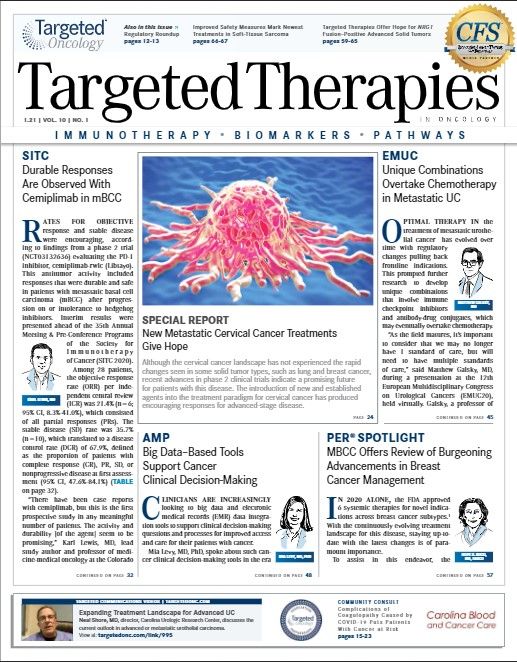Improved Safety Measures Mark Newest Treatments in Soft Tissue Sarcoma
In early 2020, the treatment paradigm of soft tissue sarcoma had 3 notable advancements with the FDA approving therapies in epithelioid sarcoma, Kaposi sarcoma, and gastrointestinal stromal tumors.

In early 2020, the treatment paradigm of soft tissue sarcoma (STS) had 3 notable advancements with the FDA approving therapies in epithelioid sarcoma, Kaposi sarcoma, and gastrointestinal stromal tumors (GISTs).
These approvals create opportunities to change the outcomes of STS. The results of 3 supporting clinical trials indicate that these new and established therapeutic agents have the potential to improve quality of life, namely with tolerable adverse effects, and change the trajectory of typical outcomes (TABLE).1-3
Given the rarity of these cancers, a review of the data that led to the FDA’s decision to approve these treatments may be beneficial to those phy-sicians treating patients across clinical settings.
Tazemetostat for Epithelioid Sarcoma
Epithelioid sarcoma, which is responsible for approximately 1% of all STSs, generally occurs in young and middle-aged adults and is known for high rates of recurrence and regional lymph node metastasis.4 For those patients in whom surgical resection is not an option, standard-of-care treatment is traditional cytotoxic chemotherapy or tyrosine kinase inhibitors, methods that have produced modest benefit.5
Most cases of disease are characterized by SMARC1/INI1 loss due to biallelic deletion of the SMARCB1 gene locus or resulting from epigenetic dysregulation.4 The loss of INI1 expression, which functions as a tumor suppressor, results in the oncogenic activation of EZH2 activity.5
On January 23, 2020, the FDA granted accelerated approval for the use of tazemetostat (Tazverik), a selective inhibitor of EZH2, for adults and pediatric patients aged 16 years and older with locally advanced or metastatic epithelioid sarcoma.1
The approval was based upon efficacy results of the multicenter phase 2 EZH-202 trial (NCT02601950), in which 62 patients with advanced epithelioid sarcoma, characterized by loss of INI1 or biallelic SMARCB1 alterations, were followed. Nine patients (15%; 95% CI, 7%-26%) had an objective response determined by investigator assessment and independent radiology review committee assessment at the data cutoff; 16 (26%; 95% CI, 16%-39%) had dis-ease control at 32 weeks.5
Thirteen patients (21%) remained free of progression at 1 year, with a median progression-free survival of 5.5 months (95% CI, 3.4-5.9). The median overall survival was 19.0 months (95% CI, 11.0-not estimable).5
Most treatment-related adverse events (AEs) were mild. Grade 3/4 treatment-related AEs included anemia in 4 patients (6%) and weight loss in 2 (3%). The investigators noted that none of the grade 3 or worse AEs that are typically observed when patients are treated with anthracycline- or gemcitabine-based chemotherapy—including nausea, neutropenia, and thrombocytopenia—were reported with the use of tazemetostat, demonstrating the agent’s superior tolerability.5
Pomalidomide for AIDS-Related Kaposi Sarcoma
The backbone of HIV-associated Kaposi sarcoma is antiretroviral therapy (ART), with the addition of paclitaxel and liposomal anthracyclines used in patients who have a suboptimal response to viral therapy. In patients with disease not associated with HIV infection, cytotoxins are generally used but standard therapy is lacking.6
On May 14, 2020, the FDA expanded the use of pomalidomide (Pomalyst)—an orally available small-molecule derivative of thalidomide (Thalo-mid) with antiproliferative, antiangiogenic, and immune-modulatory properties—to include the treatment of adults with AIDS-associated Kaposi sarcoma after failure of ART and in adult patients with Kaposi sarcoma who are HIV negative.2
The pomalidomide approval was based upon the results of the open-label, single-arm phase 1/2 12-C-0047 trial (NCT01495598), where patients received 5 mg of pomalidomide once daily for 21 days of a 28-day cycle, with 3 mg de-escalation in patients who do not tolerate therapy. Investigators treated 22 patients with pomalidomide and 81 mg aspirin once per day for thromboprophylaxis, 15 of whom were HIV positive. Sixteen patients (73%; 95% CI,50%-89%) responded to treatment, 9 of whom were HIV positive (60%; 95% CI, 32%-84%) and 7 of whom were HIV negative (100%; 95% CI, 59%-100%). The median time to response was 4 weeks (range, 4-36).6
Pomalidomide was well tolerated by patients in this study and AEs were generally mild and self-limited or resolved after discontinuing treatment. One patient did cease treatment due to exacerbation of pre-existing anxiety. Three patients developed malignancies after therapy, 2 of which occurred 12 months or more post therapy. The patients’ self-assessed health-related quality-of-life scores indicated improvement in tumor-associated edema and satisfaction with appearance.6
The investigators on the trial concluded that pomalidomide may offer particular advantage in HIV-uninfected patients, especially because it allows patients to sidestep the use of cytotoxic chemotherapy. In addition, clinicians are excited about its use in resource-limited regions where effective and tolerable agents in this set-ting are lacking.

Avapritinib Therapy With D842V-Mutant GISTs
When surgical resection of gastrointestinal stromal tumors (GISTs) is impossible, therapies that target oncogenic KIT or PDGFRA activation are standard of care for tumor control, such as the tyrosine kinase inhibitor imatinib (Gleevec).7 About 85% or more of GISTs harbor KIT mutations and up to 5% have mutations in PDGFRA. However, 5% to 6% of GIST tumors harbor the PDGFRA D842V mutation as its primary driver, which is resistant to approved targeted agents and infers poor disease prognosis.8
As of January 2020, patients with unresectable or metastatic GISTs with PDGFRA exon 18 mutations, including D842V mutations, can now be treated with avapritinib (Ayvakit) based on the FDA’s approval of the agent. Avapritinib is able to bind to PDGFRA and KIT proteins and, in laboratory studies, has demonstrated activity against a range of KIT- and PDGFRA-driven tumors.8
The phase 1 NAVIGATOR study (NCT02508532), an open-label dose-escalation and -expansion trial, enrolled patients with KIT or PDGFRA muta-tions aged 18 years or older and an ECOG performance status of 2 or less with adequate end-organ function. Investigators were examining the use of avapritinib in those with GIST to determine the drug’s safety, tolerability, and antitumor activity.8They administered oral avapritinib once daily, starting with a 30-mg dose, with increasing daily levels in a 28-day cycle until the maximum tolerated dose (MTD; 400 mg) was reached. There were no dose-limiting toxicities at or below the MTD, whereas 2 patients had dose-limiting toxicities at the 600-mg dose. There was a higher incidence of grade 3 cognitive AEs at the MTD. From these findings, the investigators recommend 300 mg as the phase 2 dose.26
The trial enrolled 237 patients, including 46 with KIT (n=23), PDGFRA D842V (n=20), and non-PDGFRA D842V (n=3) mutations in the dose-escalation portion and 36 with PDGFRAD842V mutations in the dose-expansion portion; these 82 patients were included in the safety analysis. The 56 patients with PDGFRA D842V mutations were included in the efficacy analysis.
In the PDGFRA exon 18 population, the objective response rate was 88%, which comprised 5 complete responses (9%) and 44 partial responses (79%); 7 patients had stable disease.
At 12 months, 70% of patients were maintaining their response and 81% were progression free.
AEs were mild, with most treatment-related events being grade 1/2 in severity. Cognitive effects (confusion, memory impairment, encephalopathy, and cognitive disorder) occurred in 40% of the safety population but were primarily grade 1 (23%). Intracranial bleeding occurred in 2 patients (2%) and were nonfatal grade 3 events in both cases. Grade 3/4 adverse events included neutropenia, anemia, fatigue, diarrhea, hypophosphatemia, and hyperbilirubinemia.
From these findings, the investigators conclude that avapritinib has activity with durable responses in patients with advanced PDGFRAD842–driven GISTs.
REFERENCES:
1.FDA approves tazemetostat for advanced epithelioid sarcoma. FDA. Updated January 24, 2020. Accessed December 14, 2020, 2020. https://bit.ly/3nkOZZs
2.FDA grants accelerated approval to pomalidomide for Kaposi sarcoma. FDA. Updated May 15, 2020. Accessed December 14, 2020. https://bit.ly/3a6vaBz
3.FDA approves avapritinib for gastrointestinal stromal tumor with a rare mutation. FDA. January 9, 2020. Accessed December 14, 2020. https://bit.ly/3nmtKqc
4.Czarnecka AM, Sobczuk P, Kostrzanowski M, et al. Epithelioid sarco-ma–from genetics to clinical practice. Cancers (Basel). 2020;12(8):2112. doi:10.3390/cancers12082112
5.Gounder M, Schöffski P, Jones RL, et al. Tazemetostat in advanced ep-ithelioid sarcoma with loss of INI1/SMARCB1: an international, open-la-bel, phase 2 basket study. Lancet Oncol. 2020;21(11):1423-1432. doi:10.1016/S1470-2045(20)30451-4
6.Polizzotto MN, Uldrick TS, Wyvill KM, et al. Pomalidomide for symp-tomatic Kaposi’s sarcoma in people with and without HIV infection: a phase I/II study. J Clin Oncol. 2016;34(34):4125-4131. doi:10.1200/JCO.2016.69.3812
7.Lasota J, Miettinen M. KIT and PDGFRA mutations in gastrointesti-nal stromal tumors (GISTs). Semin Diagn Pathol. 2006;23(2):91-102. doi:10.1053/j.semdp.2006.08.006
8.Heinrich MC, Jones RL, von Mehren M, et al. Avapritinib in advanced PDGFRA D842V-mutant gastrointestinal stromal tumour (NAVIGATOR): a multicentre, open-label, phase 1 trial. Lancet Oncol. 2020;21(7):935-946. doi:10.1016/S1470-2045(20)30269-2

Survivorship Care Promotes Evidence-Based Approaches for Quality of Life and Beyond
March 21st 2025Frank J. Penedo, PhD, explains the challenges of survivorship care for patients with cancer and how he implements programs to support patients’ emotional, physical, and practical needs.
Read More